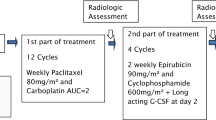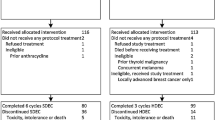Abstract
Addition of epirubicin to adjuvant chemotherapy can provide important benefits for patients with early breast cancer, but the optimal dose remains unclear. Further improvements can be achieved with dose-dense regimens, but densification of fluorouracil/epirubicin/cyclophosphamide (FEC) has proved difficult, with FEC60 providing little benefit over standard chemotherapy and FEC100 associated with toxicity. We investigated the feasibility of two intermediate dose-dense FEC regimens. Patients were randomised to six cycles of FEC75 or FEC90, with all three drugs given on day 1 of each 14-day cycle. Patients also received pegfilgrastim 6 mg as a single subcutaneous injection on day 2 of each cycle. The primary efficacy endpoint was the proportion of subjects receiving ≥85% relative dose intensity and was achieved by 96% and 88% of patients in the FEC75 and FEC90 arms, respectively. Of 147 FEC75 infusions, 4.1% were delayed, while 9.8% of 143 FEC90 infusions were delayed. The most common reasons for delay were adverse events and personal/logistical reasons. One dose reduction occurred during the study (FEC90), related to diarrhoea. Grade 3–4 haematological toxicities were reported in two patients in the FEC90 arm. There were no incidences of febrile neutropenia during the study. The most common adverse events were increases in liver enzymes and gastrointestinal events; no event resulted in discontinuation. Only one patient (FEC90) experienced serious adverse events (vomiting and throat oedema). In conclusion, dose-dense FEC75 and FEC90 are feasible with pegfilgrastim support. These regimens are associated with a very low risk of Grade 3–4 toxicity.

Similar content being viewed by others
References
US Cancer Statistics Working Group (2006) United States cancer statistics. 2003 incidence and mortality. US Department of Health and Human Services, Centers for Disease Control and Prevention, and National Cancer Institute, Atlanta
Ferlay J, Autier P, Boniol M, Heanue M, Colombet M, Boyle P (2007) Estimates of the cancer incidence and mortality in Europe in 2006. Ann Oncol 18:581–592
Early Breast Cancer Trialists’ Collaborative Group (EBCTCG) (2005) Effects of chemotherapy and hormonal therapy for early breast cancer on recurrence and 15-year survival: an overview of the randomised trials. Lancet 365:1687–1717
Levine MN, Bramwell VH, Pritchard KI, Norris BD, Shepherd LE, Abu-Zahra H, Findlay B, Warr D, Bowman D, Myles J, Arnold A, Vandenberg T, MacKenzie R, Robert J, Ottaway J, Burnell M, Williams CK, Tu D (1998) Randomized trial of intensive cyclophosphamide, epirubicin, and fluorouracil chemotherapy compared with cyclophosphamide, methotrexate, and fluorouracil in premenopausal women with node-positive breast cancer. National Cancer Institute of Canada Clinical Trials Group. J Clin Oncol 16:2651–2658
French Adjuvant Study Group (2001) Benefit of a high-dose epirubicin regimen in adjuvant chemotherapy for node-positive breast cancer patients with poor prognostic factors: 5-year follow-up results of French Adjuvant Study Group 05 randomized trial. J Clin Oncol 19:602–611
Bonneterre J, Roché H, Kerbrat P, Brémond A, Fumoleau P, Namer M, Goudier MJ, Schraub S, Fargeot P, Chapelle-Marcillac I (2005) Epirubicin increases long-term survival in adjuvant chemotherapy of patients with poor-prognosis, node-positive, early breast cancer: 10-year follow-up results of the French Adjuvant Study Group 05 randomized trial. J Clin Oncol 23:2686–2693
Norton L, Simon R (1977) Tumor size, sensitivity to therapy, and design of treatment schedules. Cancer Treat Rep 61:1307–1317
Norton L (1997) Evolving concepts in the systemic drug therapy of breast cancer. Semin Oncol 24:S10
Kahan Z, Uhercsak G, Hajnal-Papp R, Boda K, Thurzo L (2005) Dose-dense sequential adriamycin-Paclitaxel-cyclophosphamide chemotherapy is well tolerated and safe in high-risk early breast cancer. Oncology 68:446–453
Citron ML, Berry DA, Cirrincione C, Hudis C, Winer EP, Gradishar WJ, Davidson NE, Martino S, Livingston R, Ingle JN, Perez EA, Carpenter J, Hurd D, Holland JF, Smith BL, Sartor CI, Leung EH, Abrams J, Schilsky RL, Muss HB, Norton L (2003) Randomized trial of dose-dense versus conventionally scheduled and sequential versus concurrent combination chemotherapy as postoperative adjuvant treatment of node-positive primary breast cancer: first report of Intergroup Trial C9741/Cancer and Leukemia Group B Trial 9741. J Clin Oncol 21:1431–1439
Venturini M, Del Mastro L, Aitini E, Baldini E, Caroti C, Contu A, Testore F, Brema F, Pronzato P, Cavazzini G, Sertoli MR, Canavese G, Rosso R, Bruzzi P (2005) Dose-dense adjuvant chemotherapy in early breast cancer patients: results from a randomized trial. J Natl Cancer Inst 97:1724–1733
Baldini E, Gardin G, Giannessi PG, Evangelista G, Roncella M, Prochilo T, Collecchi P, Rosso R, Lionetto R, Bruzzi P, Mosca F, Conte PF (2003) Accelerated versus standard cyclophosphamide, epirubicin and 5-fluorouracil or cyclophosphamide, methotrexate and 5-fluorouracil: a randomized phase III trial in locally advanced breast cancer. Ann Oncol 14:227–232
Dang CT, D’Andrea GM, Moynahan ME, Dickler MN, Seidman AD, Fornier M, Robson ME, Theodoulou M, Lake D, Currie VE, Hurria A, Panageas KS, Norton L, Hudis CA (2004) Phase II study of feasibility of dose-dense FEC followed by alternating weekly taxanes in high-risk, four or more node-positive breast cancer. Clin Cancer Res 10:5754–5761
Oken MM, Creech RH, Tormey DC, Horton J, Davis TE, McFadden ET, Carbone PP (1982) Toxicity and response criteria of the Eastern Cooperative Oncology Group. Am J Clin Oncol 5:649–655
Cancer Therapy Evaluation Program (1999) Common terminology criteria for adverse events index. Version 2.0. National Cancer Institute, Bethesda, MD
Fumoleau P, Brain E, Delozier T, Asselain B, Serin D, Roche H, Spielmann M, Geneve J, Jimenez M, Bonnetain F (2005) Adjuvant dose-dense (3 FEC 100 followed by 3 docetaxel every 2 weeks) regimen is not feasible. Results of FNCLCC-PACS 06 study. Poster presented at the 28th Annual San Antonio Breast Cancer Symposium, San Antonio, TX, 8–11 December 2005
Schwartz J, Domchek SM, Hwang WT, Fox K (2005) Evaluation of anemia, neutropenia and skin toxicities in standard or dose-dense doxorubicin/cyclophosphamide (AC)-paclitaxel or docetaxel adjuvant chemotherapy in breast cancer. Ann Oncol 16:247–252
Burnell M, Levine M, Chapman JA, Bramwell V, Gelmon K, Walley B, Whelan T, Albain K, Perez E, Rugo H, Ding Z, O’Brien P, Shepherd L, Pritchard K (2006) A randomized trial of CEF versus dose dense EC followed by paclitaxel versus AC followed by paclitaxel in women with node positive or high risk node negative breast cancer, NCIC CTG MA.21: Results of an interim analysis. Poster presented at the 29th Annual San Antonio Breast Cancer Symposium, San Antonio, TX, 14–17 December 2006
Acknowledgements
This study and manuscript were supported by an unrestricted grant from Amgen (Europe) GmbH. Editorial support was provided by Dr. Daniel Booth.
Author information
Authors and Affiliations
Corresponding author
Rights and permissions
About this article
Cite this article
Kahán, Z., Spanik, S., Wagnerova, M. et al. Feasibility of two dose-dense FEC regimens with growth factor support for adjuvant therapy in patients with early breast cancer: results from a randomised study of the Central European Cooperative Oncology Group (CECOG). Breast Cancer Res Treat 112, 557–563 (2008). https://doi.org/10.1007/s10549-008-9894-7
Received:
Accepted:
Published:
Issue Date:
DOI: https://doi.org/10.1007/s10549-008-9894-7




